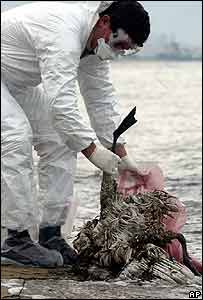
Health officials step up precautions near Thessaloniki, northern Greece
|
The deadly H5N1 strain of the bird flu virus has reached three new European countries, officials have confirmed.
The virus has been found in wild swans in Sicily, and other cases are suspected elsewhere in Italy, the country's health minister says.
A specialist UK laboratory has identified the virus in dead swans found in northern Greece and Bulgaria.
The H5N1 strain of bird flu has killed at least 80 people since early 2003, mostly in South-East Asia.
|
QUICK GUIDE

|
Seventeen migratory birds which had fallen ill or died were recovered from the Italian regions of Puglia, Calabria and Sicily.
Two of them - swans that were found in the Sicilian town of Messina - tested positive for the H5N1 strain, the Italian health ministry confirmed.
Greek health officials have intensified precautions in areas near Thessaloniki, Greece's second-largest city, where three migratory swans tested positive for the H5N1 strain.
Tests carried out in a UK laboratory also confirmed the deadly bird flu virus in wilds swans found in the Bulgarian wetland region of Vidin, close to the Romanian border.
'Difficult battle'
The UN's Food and Agriculture Organisation warned this week that bird flu could already have arrived in countries neighbouring Turkey, where outbreaks have hit 26 of its 81 provinces.
The Rome-based agency said it is working with ornithologists at more than 20 sites in southern Europe where bird migration is under way.
The infected swans found in Italy are believed to have been returning to Europe from Russia. Traps for wild birds are being set and farmers are being urged to be vigilant.
The area surrounding the lakes in northern Greece where the dead swans were found has already been sealed off.
Restrictions have been imposed on the movement of commercial poultry and a ban on hunting is in place. The measures are expected to remain in force for at least three weeks.
The BBC's Richard Galpin in Athens says that with large numbers of migratory birds entering Greece, it is going to be a difficult battle to prevent the virus spreading to poultry stocks and humans.